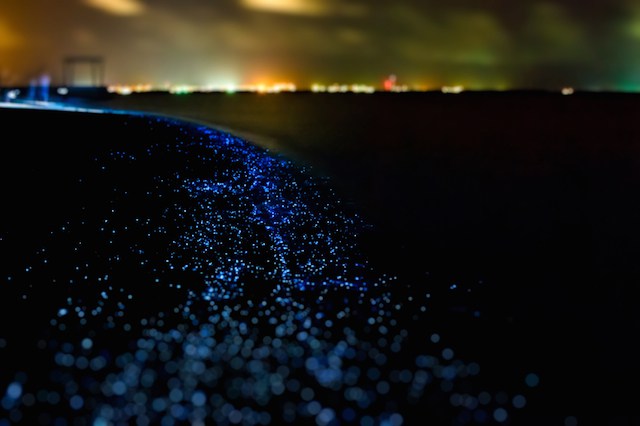Did You Know the Full Moon Can Make the Ocean Glow? Here’s How
No, this isn’t the result of magic, sorcery, or some mythical moon legend. What we have to thank for this phenomenon is Odontosyllis enopia, or as natives refer to it, the Bermuda Glow Worm.
The worms are known to give off an extraordinary luminescence almost precisely 50-55 minutes after sunset, two to five days after a full moon.
“It’s like they have pocket watches,” says Mercer R. Brugler, an assistant professor of New York City College of Technology.
Although scientists aren’t quite sure what causes their glow, they believe that it occurs when luciferin is oxidized by luciferase, a reaction that ultimately produces light during reproduction. When this occurs, females release a bluish-green bioluminescent slime and swim in a circular motion near the surface of the water. The males react by releasing short bursts of light while swimming towards the females, releasing their gametes into the water.
By studying the transcriptome – the sum of all mRNA molecules expressed within the genes of an organism – of three female O. enopia worms during a period of active bioluminescence, researchers were able to discover that the genes responsible for the bioluminescence of O. enopia are “evolutionarily unique” – unlike anything found in any other bioluminescent organism; a product of the worm’s unique genetic heritage and adaptations. Interestingly, they also found that the species contained a CoA ligase that had a strong similarity to that of firefly luciferase. Researchers have also noted physical changes in the worms prior to their mating events. They noted enlargement and pigmentation of the eyes, as well as enlargement of the nephridia, a kidney-like organ that stores and releases gametes.
Further studies hope to compare the worms’ gene transcripts to that of a control-group (such as non-mating males) to see if the gene’s functions are expressed just in conjunction with the mating events studied, or if they participate in daily processes.
So if you happen to be in Bermuda in the summer/early Autumn months, be sure to check out this marvel of nature’s incessant wonders.




